LANGUAGE COMPETENCES AND LABOUR DEMANDS: A COMPARATIVE STUDY ON READING COMPREHENSION IN SLOVAK AND SPANISH UNIVERSITY STUDENTS
One of the strategic objectives of the European Union is to achieve the best possible quality in the teaching-learning processes, and the ability to read is one of the most important competency for the current information society. The definition of reading competence has been subject to constant modifications to reflect changes in societies, economies, cultures and education levels. It is a complex and functional skill, covering processes related to the decoding and comprehension of the text.With this work we intend to comparative approach to the reading competence of first year students from Alexander Dubcek University of Trencín and from University of Valencia, and to detect and identificate their main problems with academic texts commonly used in their studies. We will start with a questionnaire with a series of basic questions, a work from a text and in-depth interviews with selected students, in order to obtain conclusions regarding their reading ability.
Release: 2017/1 Pages: 74-77 JEL classification: M53, Z13, I25
DOI:
Keywords: reading comprehension; language skills; classroom research; university students; literacy
Section: LANGUAGE COMPETENCES IN HUMAN RESOURCES DEVELOPMENT
Contacts:
Miquel A. Oltra-Albiach, PhD
Departament de Didàctica de la Llengua i la Literatura,
Facultat de Magisteri, Universitat de València
Spain
e-mail: miquel.oltra@uv.es
Rosa Pardo Coy, Grad.
Departamento de Lenguas.
Facultad de Magisterio, Psicología y Ciencias de la Educación,
Universidad católica de Valencia
Spain
e-mail: rosa.pardo@ucv.es
Elena Delgadová.
Department of Social and Human Sciences,
Faculty of Social and Economic Relations,
Alexander Dubček University in Trenčín
Študentská 2, 911 50 Trenčín
Slovakia
e-mail: elena.delgadova@tnuni.sk
Literature:
Alderson, J. C. (2000). Assessing Reading. Cambridge: Cambridge University Press.
Arffman, I. (2010). “Equivalence of translations in international reading literacy studies”. Scandinavian Journal of Educational Research, vol. 54, iss. 1, 37-59.
Arrieta de Meza, B.; Meza Cepeda, R. (2005). “La comprensión lectora y la redacción en estudiantes universitarios”, Revista Iberoamericana de Educación, n. 35/2, 1-10.
Barthes, R. (2005). Sade, Fourier, Loyola. Praha: Dokořán.
Cunningham, A E., Stanovich, K E. (1998). “Early Reading Acquisition and its Relation to Reading Experience and Ability 10 Years Later”. Developmental Psychology, vol. 33, iss. 6, 934-945.
De Brito Cunha, N.; Angeli dos Santos, A. A. (2005). “Comprensión de lectura en universitarios cursantes del primer año en distintas carreras”, en Paradígma, vol 26, n. 2 [online]. [visited: 09/15/2016]. Available in: http://www.scielo.org.ve/scielo.php?script=sci_arttext&pid=S1011-22512005000200006
Delgadova, E; Gullerová, M.; Oltra-Albiach, M. A. (2016). “Enhancing Competitiveness of Human Capital to Meet the Labour Market Demands in the EU”, in Eva Kovářová, Lukáš Melecký, Michaela Staníčková (eds.), International Conference on European Integration. Technical Universitu of Ostrava, 133-139.
Echevarría Martínez, A.; Gastón Barrenetxea, I. (2002). “Dificultades de comprensión lectora en estudiantes universitarios. Implicaciones en el diseño de programas de intervención”, Revista de Psicodidáctica, n. 10, 59-74.
European Comission (2010). Lisbon Strategy evaluation document. [online]. [visited: 09/15/2016]. Available in: http://ec.europa.eu/europe2020/pdf/lisbon_strategy_evaluation _en.pdf
González Moreyra, R. (1998). “Comprensión lectora en estudiantes universitarios iniciales”, Persona, n. 1, 43-65.
Grenčíková, A., Vojtovič, S., Gullerová, M. (2013). “Staff qualification and the quality of tourism-related services in the Nitra region”. Bulletin of Geography. Socio-economic Series, no. 21, 41–48.
Holloway, J H. (1999). “Improving the Reading Skills of Adolescents”. Educational Leadership, vol. 57, iss. 2, 80-82.
Kern, M. L., Friedman, H. S. (2008). “Early Educational Milestones as Predictors of Lifelong Academic Achievement, Midlife Adjustment, and Longevity”. Journal of Applied Developmental Psychology, vol. 30, iss. 4, 419-430.
Krajňáková, E., Vojtovič, S. (2011). “Development of Science and Education among the Priorities of State”. In 8th International Conference on Efficiency and Responsibility in Education. Prague: CZU, 143-147.
Kreiner, S., Christensen, K.B. (2014). “Analyses of model fit and robustness. A new look at the PISA scaling model underlying ranking of countries according to reading literacy”. Psychometrika, vol. 79, iss. 2, 210-231.
Olson, D. R. (1977). “From Utterance to Text: The Bias of Language in Speech and Writing”. Harvard Educational Review, vol. 47, iss. 3, 257-281.
Olson, D. R. (1994). The world on paper. Cambridge: Cambridge University Press.
Pretorius, E. (2000). “What they can´t read will hurt them: reading and academic achievement”. Innovation, iss. 21, 33-41.
Procházková, I. (2006). Co je čtenářská gramotnost, proč a jak ji rozvíjet? [online]. [visited: 07/10/2016]. Available in: http://clanky.rvp.cz/clanek/o/z/446/CO-JE-CTENAR SKA-GRAMOTNOST-PROC-A-JAK-JI-ROZVIJET.html
Sánches, M.E. (1998). Comprensión y redacción de textos. Barcelona: Edebé.
Smith, M. C. et al. (2000). “What will be the Demands of Literacy in the Workplace in the Next Millennium?” Reading Research Quarterly, vol. 35, iss. 3, 378-383.
Šajgalíková, H. (2003). Cultural Literacy. Bratislava: Ekonóm.
Švrčková, M. (2011). Kvalita počáteční čtenářské gramotnosti. Ostrava: Ostravská Univerzita.
Vojtovič, S. (2009). “Ľudský potenciál ako facilitátor rozvoja regiónu”. In Význam ľudského potenciálu v regionálnom rozvoji: Zborník z vedeckej konferencie. Podhájska: EEDA, 318-327.


